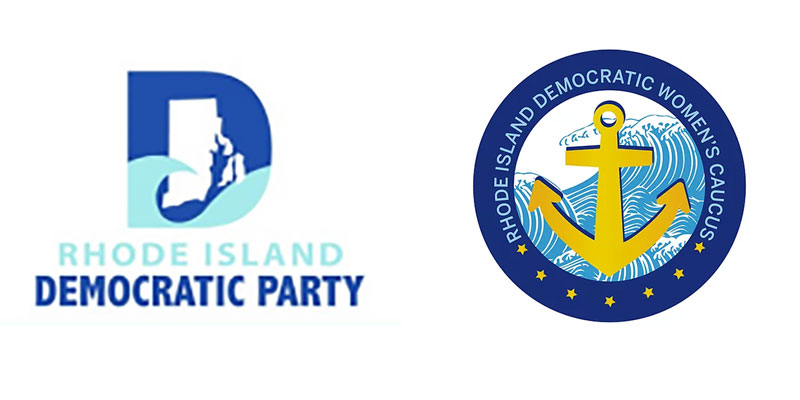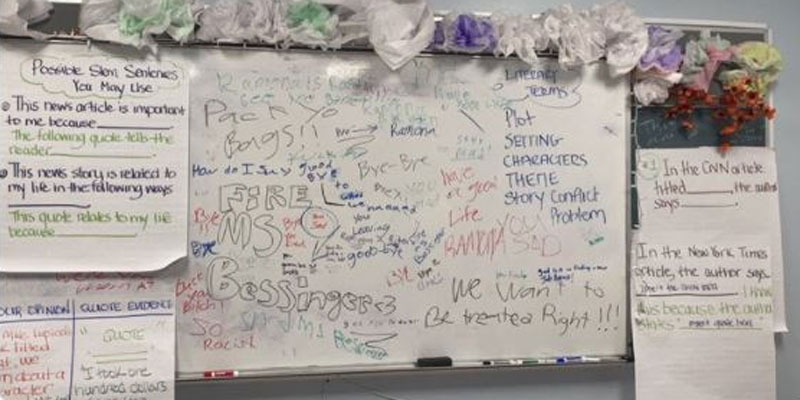For more evidence that we really live in different universes, give a read to Ruth Ben-Ghiat’s musings about the parent vax wars for CNN. It’s almost difficult to believe it isn’t a parody that flips the script, attributing to the Right what is actually the standpoint of the Left. It starts here and gets worse:
The scenes of harassment and vitriol in front of schools and in school board meetings in all parts of the country are the latest indicator of the deepening fractures in American society. While talk of a possible “civil war” may seem hyperbolic, four years of Donald Trump’s divisive and polarizing presidency, and the post-Trump extension of the GOP’s retreat from bipartisan governance, have eroded support for the democratic ideals of consensus, compromise and mutual tolerance.
In what follows, there is not a whiff of self-awareness that the divisiveness and polarization of the Trump Era was (at the very, very least) nursed and amplified by the Left. Reading Ben-Ghiat, one would have no idea that the Democrats are much more vitriolic toward their own internal dissenters and much more likely to act in lockstep. You catch no hint of irony that her fellow progressives are the one actually forcing uniformity of ideas and actions lie mask wearing and vaccination, while invalidating the right of those who disagree to be acknowledged, much less represented.
[Open full post]Russ Roberts’ conversation with writer Johann Hari on a recent episode of EconTalk was interesting for a variety of reasons, not the least because it seems Hari’s work on anxiety and depression changed his own mind a bit. One might say he’s moved toward the conservative view of the world, at least on this question, and now he finds his fellow mainstream progressives inexplicably labelling his book, Lost Connections, as “controversial.”
They’ll acknowledge, he explains, that life circumstances contribute to emotions. Lose someone or something you value, and you’ll be down. Lose your job, and you’ll be anxious. Fill your life with friends and meaningful work, and your happiness will increase. Of course, of course, of course. But then he’ll ask them “what causes depression and anxiety,” and they’ll reply, “A chemical imbalance in your brain.”
[Dr. Joanne Cacciatore] said, ‘The problem with that is once you concede that point, you have to concede that context matters. That actually, it’s not just your biology that causes these problems, although biology certainly contributes in many cases. But, the society and your individual’s life circumstances matter hugely.’ And, as Joanne put it to me: We have a system that is not built to allow all that context in.
A different person, a child psychiatrist in Melbourne, said to me: The problem is we have a model of treating mental distress that is taken from the way we treat tropical diseases. Right? So, think about malaria. So, we know the pathogen that causes malaria. I don’t know if pathogen is the right word. I apologize if it’s not. But, we know what caused the biological agent that causes malaria. We know how it’s transmitted. We know how to prevent the biological agent getting through. And, we know how to treat the individual once it has got through.
In the absence of a chemical disorder, the pathogen behind emotional ailments is your life. The chemical imbalance in your brain is, itself, caused by external circumstances. Blaming the imbalance is like blaming the symptoms of malaria on the death of cells in your body, which we might treat by trying to backfill the cell deficit with new ones. No: we correctly target the cause, which is the virus killing the cells.
Hari describes how his doctor prescribed him the medicine Paxil when he was younger for emotional pain. He says it worked for a while… and then didn’t. His doctor kept upping the dosage until Hari had reached the maximum allowed by law, and the effects still faded. It didn’t address the cause.
My doctor prescribed Paxil for me when I was in my twenties, too, although I can’t remember if I ever actually filled the first prescription. It was pretty obvious that a wave of life events followed by insufficient employment was behind my emotional state, and I resolved that I wasn’t going to medicate myself into being able to tolerate my life.
Hari’s conclusion is that medicines can be miraculous to “take the edge off” and give a person space to address more-causative problems. The next step, depending what the problem is, can be to work on issues of loneliness, by meeting people and making friends, and meaninglessness, first of all, by helping others.
The conversation didn’t go here, but there’s an obvious connection with government-centric policy suggestions (which one can infer Hari supports). Welfare, subsidies, and so on can take the edge off, but things like prices and wages are mostly signals that there’s an underlying problem to fix. Advocating for just-fix-it big government probably gives a boost of meaningfulness to advocates, but drugging our society with socialism is apt to have larger side-effects than Paxil.
Featured image by Gabriel on Unsplash.
[Open full post]If we had a healthy civic culture, wherein citizens had been adequately educated in the appropriate use of government power, it would be the stuff of scandal, rather than political bragging, that Rhode Island General Treasurer Seth Magaziner is abusing his authority over state investment funds for purposes of political activism. As he touts on Twitter:
We are using the power of Rhode Island’s $10 billion pension fund to pressure corporations to behave more responsibly.
Read how we are pushing big companies to clean up their act on:
-Climate Change
-Workers rights
-Diversity
-Drug costsand more
As the report shows, Magaziner is pushing uniformly progressive initiatives, including even lobbying for partisan legislative proposals in the U.S. Congress. From whence does this power derive? What is the due process for those who are subject to the exercise of this power?
This is absurd abuse of power.
That money has been collected from taxpayers and government employees and consolidated under the treasurer’s authority as part of workers’ compensation packages. It is invested in order to produce a return and save taxpayers money in the long run. Yet, he’s using it to claim powers his office was not intended to have.
The only recourse for those who disagree with the treasurer’s ideological abuse of his fiduciary access would be for future treasurers to run for office explicitly based on the causes that they’ll use this investment fund to promote. Is that how we want the political process to affect our choice of treasurer? It would be not unlike having candidates for secretary of state run explicitly on which causes they’d tilt the electoral playing field to help or hurt.
Of course, we know very well from recent experience at all levels of government that Democrats and progressives don’t really want that. Change the thrust of the treasurer’s investment strategy, and we’d hear non-stop how abusive the practice of ideological investment is on good-government grounds.
Featured image by Jp Valery on Unsplash.
[Open full post]Reading these results from a Pennsylvania report, it would be fair to say that government overreach during COVID has been child abuse:
A recently released annual child abuse report from the Pennsylvania Department of Human Services showed that in 2020, the state registered a 43 percent increase in child abuse deaths compared to 2019.
That is, 73 children died from child abuse in 2020 compared to 51 deaths in 2019. The increase is new and significant; reports going back to 2010 average 37 deaths a year. And it is notably higher than the 17 COVID-19 deaths in children aged 0-19 recorded in Pennsylvania not only in 2020, but also counting all COVID-19 deaths in Pennsylvania children up to Oct. 7 this year, according to a report from the American Academy of Pediatrics and the Children’s Hospital Association.
For some sense of what to expect in RI, look at Figure 1 of this report, which shows that the number of reports of child abuse were down every month, by as much as 40%. That doesn’t mean abuse wasn’t happening, but rather that it wasn’t being spotted. Since typically around 35% of reports indicate abuse, that’s over 1,100 missed abuses of Rhode Island children over seven months.
Will anybody in politics or government ever face consequences for these decisions? Probably not.
[Open full post]Controversial Rhode Island Democratic Party Senior Advisor Kate Coyne-McCoy sent a letter to the Rhode Island Democratic Women’s Caucus advising the group that it is using the word “democratic” in its name illegally, reports Steve Ahlquist on UpriseRI.
In a surprisingly sloppy letter full of misspelled words, Coyne-McCoy refers generally to Rhode Island General Law Chapter 17-23, clearly meaning section 7 of that chapter, “Protection of names of major parties.” That section reads in relevant part:
It shall be unlawful for any club or society or association, whether incorporated or not, to include in its name the word “republican” or “democrat” or any designation indicating its affiliation with a political party, unless [it has written consent from the official party organization operating in the same political level.]
This law was first passed in 1931 and was periodically amended up until 1978.
Put bluntly, the law appears unconstitutional on its face. Perhaps that is why my research can only turn up one 1976 court case, in the United States District Court of Rhode Island, citing the statute. On those occasions when intra-party squabbles arose, they may have resolved themselves out of court so as not to prove the statute unenforceable. Indeed, the judge dismissed that one case on the grounds that no enforcement action had been taken; the Board of Elections had merely requested the participants’ presence at a hearing. Presumably, if tempers hadn’t cooled, there would be additional cases.
But unenforceable, 17-23-7 almost certainly is. A similar question made it up to the United States Court of Appeals for the Fifth Circuit in 1975, under the title Riddell v. National Democratic Party. In that case, the court concluded:
… In our view the opportunity to label one’s group as part of the Democratic Party has meaning, both to active party members and to the voters– not because voters are unable to discern which group of the Democratic Party constitutes the Regular faction or the Loyalists faction, but because in our view the parties to this action assume that there is a difference between Democrats and members of other political parties. Presumably this difference goes beyond mere labels and symbols to matters of substance.
To the extent then that there is meaning to the term ‘Democratic Party,’ and to the extent that the ability to use the term affects party organization, party contributions, and party loyalty, we believe that the state’s attempt to deprive the Loyalists of the opportunity to describe themselves on the ballot as part of the Democratic Party is an unconstitutional and impermissible restraint on the Loyalists’ constitutional grarantees of free association. No state interest has been argued which in any way justifies this type of intrusion into free party organization, and accordingly we conclude that the part of the Mississippi Code which regulates the use of party labels by granting the party first to register a particular name the exclusive rights to every part of the name registered is unconstitutional.
In a footnote, the judge responds to a reaction readers of the Rhode Island statute might have, given the very sweeping nature of its ban (forbidding all use of “republican” and “democrat”:
The state has a valid interest in preventing two different parties from appearing on the ballot under the identical name, thereby making it impossible for voters to distinguish between opposing parties. In accomplishing this goal, the state may grant a registrant the exclusive right to the precise name registered; it may not, however, prevent the use of that title, when used in some sufficiently different form, by another party. Thus, in this case, the initial registrant of the name ‘The Democratic Party of the state of Mississippi’ may continue to so refer to itself, but the state may not prohibit the use of the word ‘Democratic’ when another party seeks to use that as part of its party name
Think of other countries where voters are presumed to be sufficiently informed to distinguish between “Democratic” parties that use different adjectives (Christian, Socialist, etc.). If these similarities are acceptable on a ballot, surely they must be acceptable in the names of groups that don’t purport to be parties, but merely to align with them.
It would be interesting to see if Coyne-McCoy wishes to risk further controversy dividing her party by bringing the case to the Supreme Court, but one suspects she’ll backdown pretty quickly.
[Open full post]And they’ve happened:
Deaths from drug overdose in the United States jumped nearly 30 percent in a 12-month period ending in March 2021, according to provisional data released on Wednesday.
The United States saw a record high of 96,779 reported drug overdose deaths, an increase of 29.6 percent in the period of a year from March 2020—coinciding with the onset of the COVID-19 pandemic— according to the Centers for Disease Control and Prevention’s (CDC) National Center for Health Statistics.
The corresponding CDC data shows Rhode Island on the bad side of the spectrum, with a 22% increase. That compares with a 9% increase in Connecticut, a 6% increase in Massachusetts, and a 3% decrease in New Hampshire, although Vermont led the nation at 85%.
[Open full post]That’s apparently the latest excuse for wind energy not living up to promises:
[Open full post]Is there nothing that “climate change” doesn’t affect?
Industry experts are warning that climate change may have caused wind speeds in Europe to plummet this year in news that threatens to drive energy prices even higher.
Long labelled as a saviour of the energy industry, wind farms have cropped up across the continent in recent years and have been billed a low-cost, renewable and dependable source of power…
William Jacobson reports on Legal Insurrection that while Providence middle school teacher was at an inquiry alleging that she had permitted some students out of her classroom during a practice lockdown, students wrote threatening notes on her classroom’s whiteboard and tweeted pictures at them. One of the images showed a student at the board, but Jacobson speculates that others were involved:
This was very unsettling to Bessinger, because someone was in her classroom with her school children assisting them in writing hostile and taunting messages, then photographing it, then tweeting it. Where was the substitute teacher? Where were administrators? Who took the photo and tweeted it? Middle school students don’t typically use Twitter, they use other platforms, though it’s possible one of the students tweeted them out.
The immediate question, of course, is where is the support for basic decorum in the school? This sort of behavior, if accepted can grow, as each incident sets a new precedent and defines the range of what’s permissible. The attack is primarily on Bessinger, but it harms the participants, as well, and can refocus on other teachers or staff toward whom the administration, union, and teachers have fonder feelings. So, where are they on this?
For that matter, where is the local media? A couple of years ago, the poor condition of Providence schools was the advertisement-selling outrage of the year. Where is the update on new developments — potentially racially driven attacks on a teacher?
This perspective expands out more broadly. Where is the institutional support for the concerns that Bessinger and parents across the state have expressed? Is it really the case that no other teachers, administrators, elected officials, or journalists see problems with the materials (both racial and sexual) being promoted in our schools? How is it possible that the wall is so smooth against acknowledgement of legitimate concerns, let alone suggestions that changes are in order?
My answer to these questions is that radicals have institutionalize the strategy they pioneered while advocating for same-sex marriage: Don’t debate. Just assert that everything is obvious good versus obvious bad. Ignore opposing views, and marginalize them when they cannot be ignored. Decades of indoctrination posing as education, plus the tribalism of social media, plus billions of dollars flowing through the non-profit, academic, and media worlds from wealthy progressives and the federal government have built that wall with materials salvaged from the dismantling of our shared institutions.
The solution can only be to rebuild so that alternative views can be expressed and find an audience.
[Open full post]It’s not in New England, but pretty close: a judge actually sided with healthcare workers against the mandate regime:
A federal judge ruled Tuesday that New York must continue to allow healthcare workers to seek exemptions from a statewide COVID-19 vaccine mandate on religious grounds as a lawsuit challenging the requirement proceeds.
Judge David Hurd in Utica had issued a temporary restraining order a month ago after 17 doctors, nurses, and other health professionals claimed in a lawsuit their rights would be violated with a vaccine mandate that disallowed the exemptions.
The article notes that Hurd differed from other judges in thinking that “the public interest lies with enforcing the guarantees enshrined in the Constitution and federal anti-discrimination law.” It’s depressing that more judges don’t think that’s where the public interest lies.
[Open full post]The damage that public health authorities have done to their credibility by refusing to demonstrate due acknowledgment of naturally acquired immunity to COVID-19 has been immense. Perhaps they’re ideologically motivated, but it might be as simple as believing that the risks of vaccination are low enough and its effectiveness high enough that the clarity and ease of a message of vaccinating everybody is decisive.
If that’s the thinking, though, then they have to tell people that’s the thinking. Otherwise, as we’re seeing, the ease of the message gets swamped by skepticism.
It doesn’t take much to see the value of nuance in these decisions. Consider the following, from an Epoch Times article by Ivan Pentchoukov, regarding research in Finland showing natural immunity lasting for at least a year:
The scientists then investigated antibody levels one year after infection by randomly selecting 367 subjects from the original cohort who hadn’t yet been vaccinated. Eighty-nine percent of the subjects still carried neutralizing antibodies, and 36 percent still carried the IgG antibody.
Antibody levels were higher in subjects who had experienced severe COVID-19 disease. Compared to those who had mild disease, these subjects had two to seven times as many antibodies for at least 13 months after infection.
“Studies of individuals who have recovered from [CCP virus] infection are crucial in determining for how long antibodies persist after infection and whether these antibodies protect against re-infection,” the scientists wrote.
Pay particular attention to the middle paragraph, because it’s crucial not only for individual decisions, but for our very understanding of the pandemic.
Attempting to leave natural immunity entirely out of the conversation raises inevitable skepticism about the government’s advice. Among those who are skeptical, there will be some who had moderate-to-severe COVID and know they are immune, but there will also be some who merely tested positive and are likely not immune. Because the latter know the government is lying to them, they may not consider that they are slipping through the immunity cracks.
The issue affects our understanding of the pandemic, as well, because it affects our ability even to have an accurate picture. As noted in this space a few weeks ago, the reason some studies find that natural immunity is iffy is that many people were told they had been infected when a more-considered judgment would have told them that they had not.
In that light, the reason natural immunity is less than might be expected is that the pandemic was not as pervasive as we pretended. And if the pandemic was not as pervasive, then many of those “cases” listed as “hospitalizations” and “deaths” should not have been counted in the COVID toll, either.
The overall impression, which reinforces skepticism, is that the public health authorities (aided and abetted by the media) overreacted and threw the world into devastating turmoil. Now, they’re hoping they can just get everybody vaccinated and move on as if there’s nothing to see, here.
Put differently, they can’t be honest, because they’ll be exposed. (And whether fair or not, that exposure will lend credence to suspicions that some of them did it knowingly, for political reasons.) That reality, in turn, casts a shadow over everything they might suggest, from masks to quarantines, because it could very well be just a continuation of the coverup.
Featured image by the CDC on Unsplash.
[Open full post]






